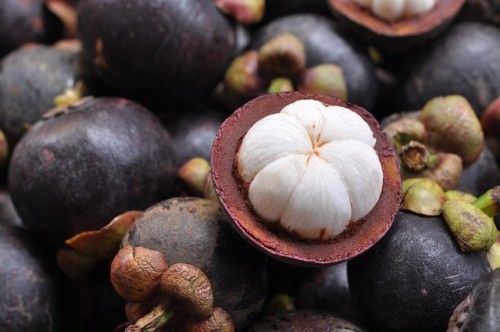Mangosteen – a fruit from Southeast Asia with many benefits
Mangosteen trees grow mainly in Southeast Asia, but are also found in Central and South America, as well as in Australia. Their fruits reach about the size of a tomato or kiwi and are very rich in antioxidants.
Mangosteen can be consumed as a tasty fruit and is widely used in alternative medicine, for example for weight loss.
Mangosteen is often called mangosteen or mangostin after its most important ingredients.
Mangosteen fruit as a food
This fruit can be eaten directly as a fruit. However, they should be peeled, because the peel is bitter. The pulp itself tastes slightly sour, somewhat like peach, but also a little reminiscent of pineapple and banana.
Despite the partial similarity of the name, it has nothing to do with mango. Mangosteen can be used to make jam, tea and fruit juice.
Both raw and in processed form, mangosteen fruits are a valuable addition to our meals. Recently they are also processed into powder.
Mangosteen for weight loss
Powdered drinks can be made from these fruits. This special mangosteen preparation contains the active ingredients of the fruit in concentrated form and is therefore particularly effective for weight loss diets.
The soluble powder can be mixed with juice, water or yogurt. Half a teaspoon of powdered mangosteen in the morning and in the evening is a recommended dose.
It suppresses excessive hunger pangs. In addition, body fats are burned with the help of the contained alpha-omega acids. In addition to weight reduction, it strengthens the immune system.
It also lowers blood pressure and the risk of diabetes and heart attack. Mangosteen as a drinking powder is therefore not only recommended to overweight people.
Other effects
Due to the contained antioxidants the metabolism is accelerated. This contributes to better detoxification, making you healthier and less tired. Mangosteen and products made from it have anti-inflammatory, antipyretic and analgesic effects.
Therefore, naturopathy and alternative medicine use such preparations for skin inflammations, mouth and throat diseases, stomach and intestinal problems, tuberculosis, as well as against bladder infections and malaria.
These fruits contain xanthones, which greatly reduce the so-called free radicals in human metabolism, so that our immune system remains healthy.
Also an anti-aging effect is attributed to the xanthones. When used regularly, it is even said to have a positive effect on the prevention of cancer, Alzheimer’s, Parkinson’s, cataracts and other diseases.
Mangosteen in combination with other active ingredients
Combined with other fruits or other natural ingredients, mangosteens can achieve even better effects in healing processes and weight reduction. It should be noted, however, that it does not contain added sugar.
Mixed with berries with a high vitamin C content, for example, it is a very healthy food combination as a compote or snack.
Cultivation of mangosteen plants
Mangosteen plants or trees are very sensitive to climatic conditions. They thrive best at temperatures between 20°C and 35°C and should never be exposed to temperatures below 4°C and above 38°C.
Therefore, they have a chance only in certain areas of the world. Mangosteen trees do not need pest control, because the antioxidants contained in the fruits defend themselves against pests.


